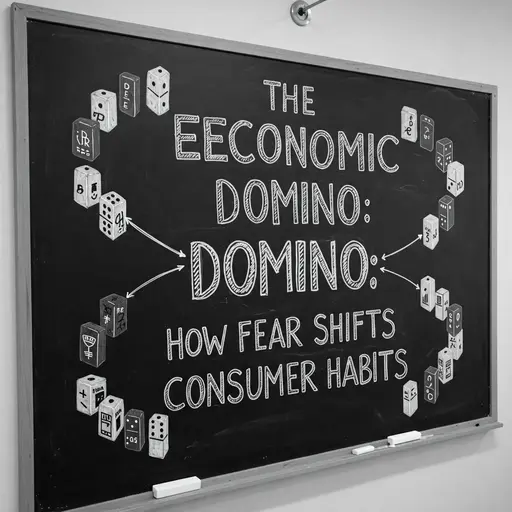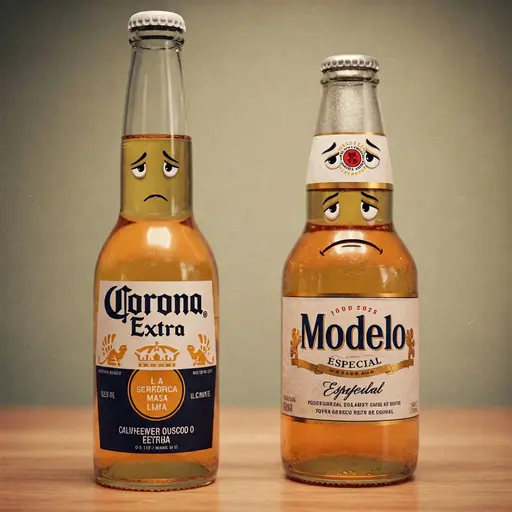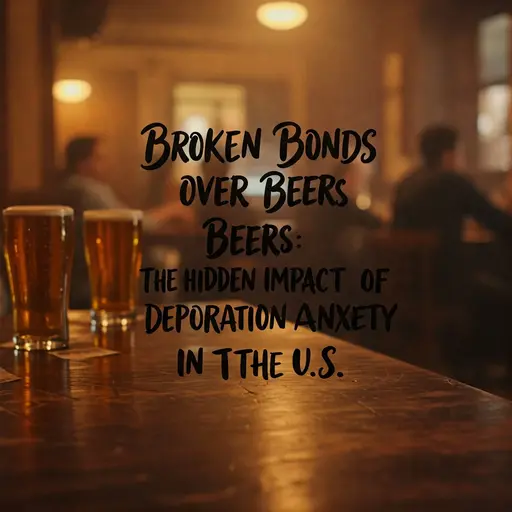✨ Introduction: Fear, Beer & Policy – A New American Story
Imagine buying a six-pack of your favorite beer and wondering if it might be your last trip to the store for a while—not because of price hikes, but fear. This is not a dystopian fantasy, but a reality facing many Latino consumers across the U.S. in 2025.
President Donald Trump’s renewed immigration crackdown has taken an emotional and economic toll on one of America’s most vibrant communities. The fallout? A surprising yet deeply symbolic hit—beer sales, particularly those of iconic Mexican brands Modelo and Corona, are dipping. But this isn’t just about beverages—it’s about fear, identity, and the shifting rhythms of daily life.

🧱 The Economic Domino: How Fear Shifts Consumer Habits
Constellation Brands, the parent company of Modelo and Corona, reported a noticeable dip in beer shipments—a 1% decline that may seem small on paper but signals a deeper trend. Their CEO, William Newlands, made a sobering statement:
“A lot of consumers in the Hispanic community are concerned right now. Social gatherings, an area where the Hispanic consumer often consumes beer, are declining today as part of these overarching concerns.”
🔍 Key Insight: Nearly 50% of Constellation’s customer base is Hispanic. When fear replaces freedom, even everyday joys like socializing and sharing a cold beer disappear.

🎯 Under the Surface: What a 1% Decline Really Means
At first glance, a 1% dip in shipments might look like a blip—a rounding error in the beer world. But when that sliver represents millions of bottles not cracked open at birthdays, baptisms, or block parties, it reveals something deeper: a cultural pause.
🍺 The Missing Moments
Beer isn’t just a beverage in Hispanic culture—it’s the glue of the gathering. The fact that these shipments are slowing tells us that something sacred is being disrupted: community connection. And that disruption is measurable in lost sales, quieter nights, and smaller celebrations.
📊 An Unofficial Barometer of Community Mood
Constellation Brands has, inadvertently, become an economic weathervane. When their shipments drop, it’s not just logistics—it’s sociology. It reflects shifting winds in household sentiment, community safety, and collective joy.
💡 What’s Actually Vanishing
It’s not just beer consumption—it’s:
- The local DJ who didn’t get hired this weekend.
- The taco stand that sold half its usual Friday-night orders.
- The bodega cooler staying a little too full.
🚧 Beyond Beer: It’s an Emotional Economy
The Hispanic consumer base isn’t retreating because they’ve lost interest in brands—they’re retreating because they feel unsafe. The emotional toll of fear—from sudden ICE raids to profiling—is being translated into economic caution.
🔁 Corporate Crossroads
Companies now face a defining choice:
Will they ride out the decline and hope for recovery, or will they step up as allies, investing in the healing of the communities that helped build them?
📉 Where It Hits Hardest: A Table of Economic Impact
| Retail Segment | Impact | Consumer Behavior Shift |
|---|---|---|
| Convenience stores (bodegas) | Major decline in foot traffic | Shoppers avoid small, community-focused spaces |
| Large retail chains (Walmart, etc.) | Increase in visits | Attempt to blend in and avoid attention |
| Restaurant and bar sales | Noticeable drop | Fear of public gatherings |
| Overall beer shipments (Q1 2025) | ↓ 1% | Largest drop in Latino-majority zip codes |
🧠 Real Story: Carlos from San Diego

Carlos, a Salvadoran father of two, used to meet friends every weekend at a local taco bar where Modelo was the beer of choice. Since a neighbor was mistakenly deported during a routine ID check, he hasn’t returned.
“It’s not worth the risk,” he says. “We’ve started hosting very small gatherings at home, with no more than two or three families. We even avoid shopping at our usual corner store. We go to Target now.”
Carlos’s story isn’t rare—it’s echoed in communities from Los Angeles to Houston.
🎙️ Carlos’s Story Is America’s Wake-Up Call
Carlos isn’t just avoiding a taco bar—he’s quietly reshaping the economy with every cautious decision.
🍻 What’s Missing Isn’t Just the Beer
It’s the ritual. The laughter over plates of carnitas. The sound of a jukebox humming cumbia. The Modelo bottles clinking as symbols of belonging. When Carlos stays home, a small business loses revenue, a server loses tips, and the local distributor misses a sale. Multiply that by thousands of families—and you start to see the magnitude.
🛒 Targeted Shifts
His move from the local store to Target may seem small, but it reflects a powerful trend:
✅ Seeking anonymity.
✅ Prioritizing perceived safety over local loyalty.
✅ Consolidating shopping trips to limit exposure.
🧩 Microchoices, Macroimpact
Every changed habit—every skipped outing, avoided store, or low-key gathering—adds up. And when it’s happening simultaneously across major cities like Los Angeles, Houston, Chicago, and Phoenix, it becomes a tidal wave that touches everything from advertising budgets to warehouse stock levels.
🔁 The Trust Loop: Broken
Trust is the invisible currency behind spending. When it’s shaken—even by one story like Carlos’s—whole communities contract inward. And businesses, especially those deeply woven into Latino neighborhoods, feel the chill.
📌 What Brands Should Ask Themselves Now:
- Are we a part of this community—or just selling to it?
- Do our safety policies reflect empathy or enforcement?
- Are we amplifying voices like Carlos’s—or ignoring them?
🚀 Next-Level Insight:
Some brands are already adapting. They’re creating safe-space loyalty programs, partnering with immigrant advocacy groups, and training staff on cultural sensitivity. Not as PR stunts—but as strategic moves to rebuild what’s been quietly lost: trust and joy.
🧩 A Larger Pattern: Multiple Industries Feel the Squeeze
Constellation Brands isn’t the only one reporting the ripple effects. A growing list of companies are struggling with the unexpected consequences of political decisions:
- 🛍️ Burlington and Foot Locker: Noted reduced foot traffic in Latino-heavy areas.
- 🧼 Colgate-Palmolive: Vice President John Faucher stated they’ve seen “lower traffic from Hispanic consumers.”
- ⚡ Monster Energy: Noted declining convenience store sales in urban Hispanic neighborhoods.
💡 Fact Check: Market research firm Circana revealed that discretionary purchases among Hispanic consumers have declined more rapidly than among other groups in 2025.

🔍 Decoding the Domino Effect: When Policy Hits the Pocketbook
The data tells a deeper story—one that stretches far beyond beer. Across retail shelves, stockrooms, and marketing departments, companies are waking up to a profound truth:
👉 When fear and instability creep into everyday life, wallets close and routines shift.
📉 Retail’s Tipping Point
Stores like Burlington and Foot Locker aren’t just seeing fewer shoppers—they’re witnessing a disappearance of rituals. Casual mall trips. Back-to-school splurges. Weekend errands. These aren’t just purchases—they’re community habits. And when trust erodes, so do those habits.
🧼 Household Brands Take a Hit
Even essentials aren’t immune. Colgate-Palmolive—a brand in nearly every home—reports declining Hispanic engagement. It’s not necessarily because families are brushing less, but because consumer behavior is shifting toward budget-focused or culturally resonant alternatives.
⚡ Energy Drinks, Less Energy
Monster Energy is feeling the chill in urban convenience stores—once a hotspot for on-the-go purchases. Why? Fewer quick pit stops. Less socializing. And perhaps most importantly: a growing sense of caution.
🧩 The Bigger Economic Puzzle
💡 Fact Check: According to Circana, discretionary spending among Hispanic consumers has dropped faster than any other demographic group in 2025. That includes everything from snacks to sneakers to streaming subscriptions.
💬 Why This Matters
Latino consumers contribute over $2.8 trillion to the U.S. economy. When they pull back, it’s not just a “community issue”—it’s an economic reckoning that reverberates through boardrooms and balance sheets.
🚦Smart Strategy Shift:
Companies that want to weather the storm must move from treating Latino consumers as a market segment to honoring them as a cultural backbone.
🔍 Expert Analysis: The Psychology Behind the Numbers
Why does fear affect buying habits?
- 🧠 Safety-first mindset: When people feel targeted, they limit exposure—even for casual activities like shopping or dining out.
- 🏠 Increased home gatherings: Shoppers shift toward private, low-profile consumption.
- 💼 Retail perception shift: Smaller, family-owned bodegas are seen as more “visible” and thus avoided in favor of anonymous megastores.
RBC Capital Markets analyst Nik Modi notes:
“This has manifested in a pullback from retail. Hispanic communities are facing mounting pressure, and this is translating directly into economic behavior.”
💡 Tips & Insights for Businesses in 2025
📌 1. Local Outreach = Trust
Businesses should consider launching culturally sensitive ad campaigns assuring community safety and support.
📌 2. Deliver-to-Door Options
Offer discreet delivery services with Spanish-language interfaces.
📌 3. Partner with Community Leaders
Sponsoring safe-space events and supporting local nonprofits can rebuild trust.
📌 4. Data-Driven Stocking
Adjust inventory levels and offerings based on real-time, zip-code-specific sales data.
📌 5. Expand E-commerce Presence
Latino consumers are increasingly turning to online shopping—tap into that.
📌 6. Bilingual Customer Service
Hire bilingual staff or implement AI chatbots that speak both English and Spanish fluently. This builds rapport and smooths the buying process.
📌 7. Celebrate Cultural Moments
Create campaigns around cultural holidays like Cinco de Mayo, Día de los Muertos, and Hispanic Heritage Month to show authentic appreciation.
📌 8. Highlight Community Success Stories
Feature local Latino entrepreneurs, customers, or employees in your marketing—storytelling builds emotional connection.
📌 9. Flexible Payment Options
Offer installment plans, mobile payment solutions like Zelle or Cash App, and accept EBT where possible to accommodate a wider range of customers.
📌 10. Hyperlocal Social Media Strategy
Use geotargeting to create neighborhood-specific ads and content, especially on platforms like Instagram, Facebook, and WhatsApp where Latino audiences are highly active.
Want me to continue with even more tailored insights or dive deeper into one of these tips?

🌟 Surprising Insight: How Beer Reflects Identity
For many Hispanic Americans, beer isn’t just a beverage—it’s a symbol of community, celebration, and cultural heritage. Modelo and Corona, in particular, evoke pride and tradition.
When policies sow fear, they do more than reduce sales—they fracture the social fabric that drives entire economies.
When fear enters a community—through immigration crackdowns or divisive rhetoric—spending habits shift subtly but powerfully. Social gatherings shrink. Celebrations become quieter. And with them, beer sales drop.
But it’s not just about fewer cans of Modelo sold—it’s about fewer quinceañeras, fewer backyard barbecues, fewer Sunday fútbol watch parties.
🌟 Beer Brands as Cultural Beacons
Brands like Modelo and Corona have become more than just market leaders—they are cultural anchors. Their advertisements often mirror the values of familia, orgullo (pride), and resiliencia (resilience). When a community feels threatened, even these symbols can feel hollow.
🌟 What Smart Businesses Are Doing
📌 They’re doubling down on community-focused messaging.
📌 They’re sponsoring local events—even if they’re smaller, quieter, or more private.
📌 They’re embedding respect into every touchpoint, from ad copy to in-store signage.
👉 The lesson? Respect the culture, and you won’t just retain sales—you’ll build loyalty for generations.
📌 Conclusion: What’s at Stake
The dip in Modelo and Corona sales isn’t just a hiccup in the alcohol industry—it’s a thermometer for measuring the tension in immigrant communities across America. What we see in sales charts and quarterly reports are really reflections of lives interrupted, celebrations postponed, and identities pushed into the shadows.
If you’re a business owner, policymaker, or even just a consumer—understand that your actions and choices ripple through society. Support inclusivity. Demand empathy in policy. And remember: even a bottle of beer can tell a powerful story.

